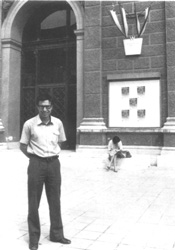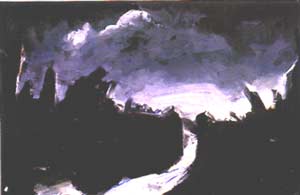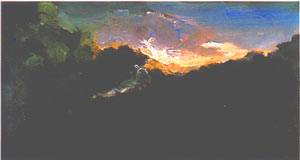|
BENET
CASABLANCAS DOMINGO
|
Biografie
Werke
Über Casablancas
Werkbetrachtungen
Versió catalana
Biografie
Benet Casablancas Domingo was born in Sabadell, 1956. 
He took his high degree in music at the Higher Conservatory of Barcelona, where
he worked with A.Ros-Marba and C. Guinovart, and has been a pupil of Josep Soler.
He graduated in Philosophy at the Autonomous University of Barcelona, where
he worked under the direction of F Bonastre. During the academic year 1982?83
he was granted a scholarship to study musical composition with F Cerha at the
Hochschule fur Musik in Vienna.
He is a member of the "Associaci6 Catalana de Compositors,, and
patron of Fundació A.C.A., and has received assignments from several societies
and interpreters (Música XXI, A.C.C., JJ.MM. de Catalunya, Orquestra del Teatre
Lliure, etc.), be ing especially devoted to composition for the stage, dance
and cinema and taking part in different festivals in Catalonia, Spain and abroad
(International Festivals of Barcelona, "Hispano mexicano" of Mexico, Bordeaux,
Alicante, San tiago de Compostela, "Setmanes Catalanes de Karlsruhe., International
Conferences Mozart and Dvorak in Prague, A. Webern Congress of Vienna, International
Conference ,Spain and Western Music" in Salamanca, etc.).
He is an adviser and regular contributor to numerous entitites and publications:
Fundac16 Caixa de Pensions, RNE, Recerca Musicològica Saber, L'Avenc, Revista
Musical Catalana, etc., He has been conductor de JJ.MM. of Sabadell and Vilaseca?Salou's
International Course of Music chamber orchestras. His work are published by
EMEC, A.C.C., CLIVIS, Fundación Juan March and Catalana d'Edicions Musicals.
He has been awarded several prizes: Second prize in the II Composition Contest
organized by the Spanish JJ Composers' Contest organized by the Barcelona JJ.MM
(1983) and in the I and III Young Com posers' Tribunes organized by the ,Fundac16n
Juan March,, (1982 and 1984), ,Ferran Sors" Prize awarded by the "Generalitat
de Catalunya" and the "Diputació de Barcelona" (1984), II New York Musicians'
Accord (1986), etc.
He is the Head of the Department of Theoretical Subjects in the Professional
Conservatory of Badalona and teacher of Formal Analysis, Harmony and Counterpoint
in the "Escola de Musica de Barcelona,,.
Werke
Some of his works are:
Four fragments for String Orchestra (1977-81),
Three Erotic Poems for Soprano and Chamber Orchestra. (1981),
"Poema d'E.A. Poe for mezzo and orchestra (1982),
"D'Humanal Fragment for contralto and string quartet (1982),
Elegy in three movements. for big MM (1982),
First Prize in the IV Young orchestra (1987),
Five Pieces for Orchestra (1988).

Über Benet Casablancas
Wien, 20.3.1988
Viele jüngere Komponisten sind heute der Überzeugung, daß der
Avantgardismus an einem toten Punkt angelangt sei, von dem es nur noch Wege
in die Sterilität und in trockenen Akademismus gäbe. Gleichzeitig
ist nach einer Zeit handwerklicher und wohl auch rationaler Verwahrlosung zunehmend
etwas wie Sehnsucht nach Differenziertheit, nach "Kultur" in der Behandlung
der musiksprachlichen Mittel zu beobachten. Beides führt dazu, an historische
Positionen anzuknüpfen, die Werke hervorgebracht haben, denen man sich
wesensverwandt fühlt. Für Benet Casablancas sind es die der zweiten
Wiener Schule etwa knapp vor dem ersten Weltkrieg. Seine 2 Klavierstücke
von 1978 und die 4 Fragmente für Streichorchester zeichnen sich durch krattvollen
Ausdruck, spannungsvolles Ausspielen von Kontrasten und sicheren Einsatz der
Mittel aus .Seine bisher reifste Arbeit aber scheinen mir die "Cinc Interludis"
für Streichquartett zu sein, ?sicher durch? geformte Sätze in einer
sehr sensibel behandelten homogenen Sprache. Auf seinem zukünftigen Weg
wäre es ebenso unfruchtbar weiter zurück in die Bereiche spätromantischer
symphonischer Gestik zu gehen, wie die Entwicklungen der letzten 50 Jahre ein
zweites Mal vollziehen zu wollen. Einem ungewöhnlich begabten Kopf wünschen
wir bei der schwierigen Gratwanderung zu sich selber und zu Neuem gutes Gelingen.
Friedrich Cerha
Lieber Maestro,
Auch ich darf Sie wohl so nennen! Ich habe mich gefreut, unter den Stücken
Musik, die ich von ihnen zu lesen und zu hören bekam, einiges wiederzufinden,
was noch aus Ihrer Wiener Studienzeit stammt und schon damals versprach, was
jetzt in Ihrem gegenwärtigen Musikschaffen eingelöst ist. Der Zusammenhang
ist unüberhörbar: Wien lässt grüssen!
Ihr Karl Heinz Füssl
FROM THE GALE OF SIGHS TO THE GEOMETRY OF SILENCE
This gale of sighs, which rides across the immaculate space of the eve with
a mask of slowness and prodigies of homily, and stabs lamentations in its roughness
breaking them into sharp pieces of terrifying vengeance; this enchanting gale,
where ruptures summon to an unexpected feast the diaphanous shadows of a mystere
that is approaching, full of movements in disagreement and dissimilar images;
this gale of sighs, which accepts the rules of a nonexistent law on the edge
of the abyss and lights the furtive glows of memory; this gale that takes the
form of an unlimited accent and proclaims the starry immensity of darkness with
exulting brightness; this gale of sighs stolen from every silence of strategic
human speech, which isolates itsef on becoming knowledge, not confusion, and
generates all the sonorous nuances of the great tragedy of living from its imperturbable
enclosure; this gale turned into revolt, cutting of lyrical ideas put into the
mouth of passion, which contemplates the roots of progress and the convulsion
of things with eyes of haunted rain; this gale of sighs, which clenches the
thirst for unbalance and cunningly arranges the magnetized liturgy of the unknown,
which possesses the changeable heart of those who love the disturbing face of
mystery without prejudices; this precise gale, with a mathematical staff, which
raises the synthesis of instants in the absolute order and outilnes the boundaries
of new world accustomed to .the memory of senses and to the stimulous of reviving,
without the exctitation of wisdom, to every word in harmony, to every sip of
fertilizing plenitude, to every lightning that crosses the undamaged desert
of darkness; this gale of sighs, which opposes to the strident noises of the
great parody, which insists on desiring the cruelty of beauty as a payment and
tribute to its behaving like a watchman in love with those subtle regions that
coincide under the accidental cover of looks; this gale prisioner of notes and
of their vivifying impromptu, which searches the language of the present in
emotion, under the shivering skin of ecstasy, and soaks the distance with soft
perspiration of immortal youth until it makes it so elastic that it can take
the melody to unexpected limits, where reason and feelings crave for impossible
love in secret nuptials, where the scorcery of time stops in order to give way
to the transparent pan tings of respiration; this gale of orphaned foot prints,
which transforms perpetual absences into geometry of silence under the indolent
weight of mystery; this sacramental gale, which under the dark moon snatches
those who impregnate life with devout delectance, which swells up and explodes
like a volcano, is the poet's universal heart, the seeds of the intimate monologue
of BENET CASABLANCAS, who penetrates the impious labyrinth of miracles with
extreme licence.
Josep-Ramon Bach Barcelona, February 1987

MUSIC AND IMAGINATION
Benet Casablancas' work has always tried -it already did before his going to
Vienna, but especially after he came back? to respond to the demands of imaginative
music. Here imagination should not be undestood as simple, capricious, dreamy
fantasy, nor as the opposite of intelligence and skill, but as what imagination
really is: an activity that is both utopian and free and, consequently, revolutionary.
Confronted with this world, Benet Casablancas' Music knows that it is full
of injustice and grief, and protests with all its streght against such a reality.It
is in this sense that it is imaginative and revolutionary. It is in this sense
that it is music that contains truth, that is, true music.
But, aware at the same time of the evolution of Musical material through the
centuries, Benet Casablancas' Imagination takes the final stage of this evolution
?the riskiest and most committed one? as its base. This reveals that it is not
an accommodating kind of music, one that devotes itself to singing the wordly
glories of future and present.
His music tries to intuit a fairer world, though without seeking to impose it
by force. Although technically it is not licit to individualize each of the
"Five Interludes for String Quartet quasi variazioni" (1983), anyone who wishes
to listen to a sort of music that longs for a better future should listen to
the fourth of them ?"Poco allegro"?. Here this expression should be given not
only its dynamic?musical meaning, but also the literal one: "There is little
joy in this world". That explains why this interlude is followed by another
one entitled "Piu Mosso", as if the author wanted to say imaginatively: "It
is necessary to make the revolution".
Andres Sanchez Pascual
In an age of value-destruction -a wise destruction, if one assumes that those
values contained such a serious error as the appearance, in the West, of our
Christian culture and its images and ethics based only on blood and guilt?,
in the destruction of those values and in the construction ?in the arising through
thinking of the origins, of the real foundations which are a meditation about
being as was first done in Greece?, in this construction, which is difficult
and involves a long, extremely complex evolution, the assumption of new myths
and perhaps the need to look back, towards the alpha point, with its immanent
terror of 'the beginning' ?after two thousand years of fearing the future, of
fearing death which gulps down reason and the meaning of any life?, in the construction
of certain values that banish all culpability from the essence of human beings,
music, an art that was born and always lived coiled round the gloomy tree of
institutionalized religion, now has to cover ?it opens before itquite a complex
path: the terrible aesthetic disintegration of many of the'musics' of 'today'
is a clear example of that: they show an attempt to bring back to life ?through
sumptuous, atrociously ignoble performances? the liturgies that were meant to
give meaning to a religation that makes no sense anymore; but this is just the
decomposition of a body wich died long ago; other musics attempt ?perhaps based
too immediately on a dead past which is, however, impossible to break away from?
to make way for the organization of certain starting points that make it possible
to accede to the beginning of a new cycle of humanity where musical art may
also have a place.
The omega point towards which a civilization that was not possible ?devoured
by its inconsequence, i.e. 'sanctification through numbers'seemed to tend, might
be after all this point situated at the beginning: in thinking, in what is now
regarded as utterly contemptible and sinister and all governments in the world
try to prevent: that man should recover his thinking capacity and finally possess
his own judgement.
The works that make up this recording belong like those by other composers,
not many but existing, and among whom I wish I could rank? to the group of 'other
musics': none of us will see the splendour of the new cycle, but we are left
with the distressing pride of having been tenacious workers at the most difficult
moments; the pride of having laid the foundations of a new building with stones
picked up among the ruins.
Josep Soler Reial Academia Catalana de Belles Arts de Sant Jordi
Zur Übersicht


